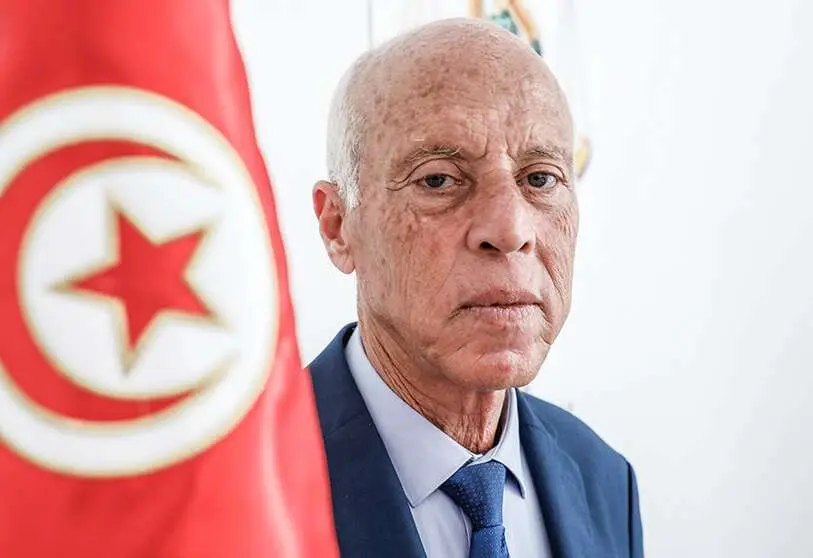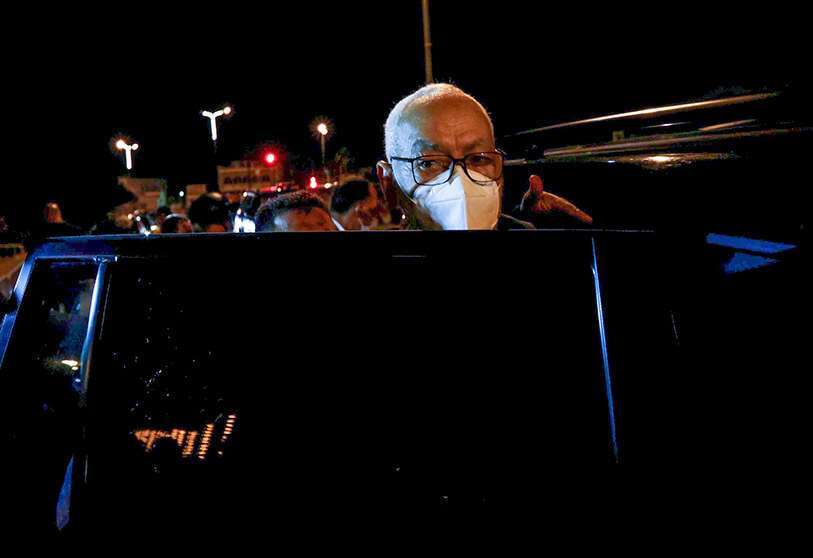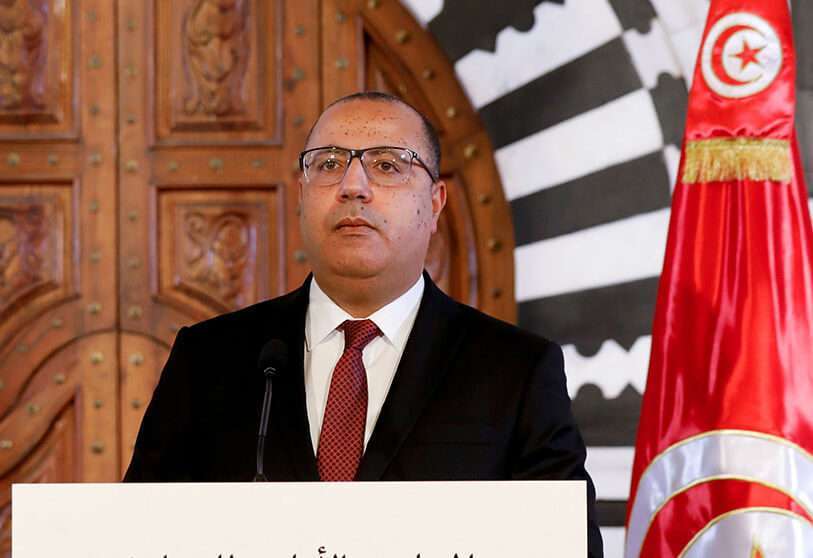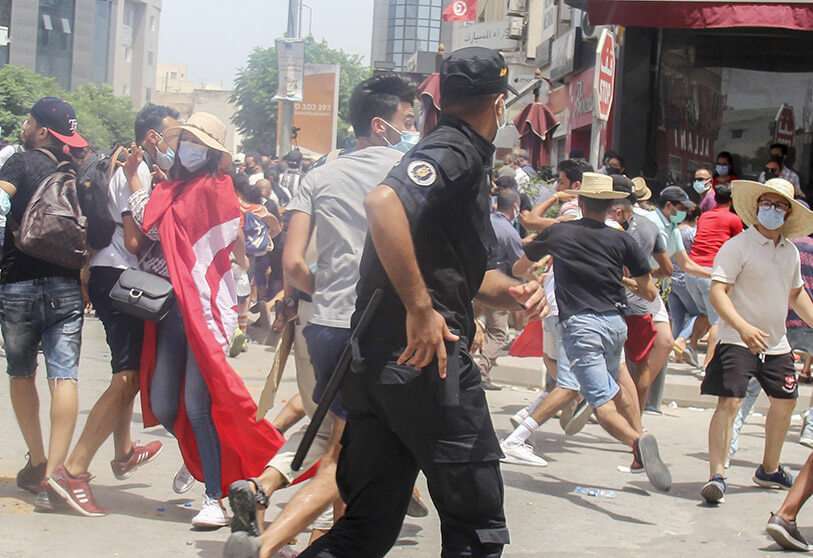Tunisia's president confronts Islamist conspiracy

The Tunisian president denies accusations of a coup d'état and claims that his initiative to dismiss the prime minister, take over the functions of the executive, the attorney general's office and temporarily freeze parliament for 30 days is due to the need to "save the country" from the serious crisis it is suffering due to the conspiracies of Islamist groups led by the Ennahda party, supported by the Muslim Brotherhood, with full influence over the ousted prime minister through the speaker of parliament, Ennahda leader Rached Ghannouchi.
The spark for President Saied's decision was the dismissal of the health minister, Fawzi Mahdi, from the president's party, who was pressured into launching a vaccination campaign without the necessary preparation and means, leading to his dismissal. However, public unrest took the form of a large demonstration on Sunday morning in front of the parliament building, the headquarters of the Islamist Ennahda in four provinces. The popular protest over the severe economic and social crisis that Tunisians have been suffering for years, aggravated by the coronavirus pandemic, was channelled against the government, calling for the dismissal of Prime Minister Hichem Mechichi, the dissolution of parliament and a change in the political system. The demonstrations spread to the provinces of Tozeur, Kairouan, Sidi Bouzid, Sfax Nabeul, Gafsa, Sousse, Mahdia and el Kef chanting slogans against the Speaker of Parliament and leader of Ennahda and the Muslim Brotherhood in Tunisia, Rached Ghannouchi.

President Saied also took to the streets to meet his jubilant supporters in the same street that witnessed the largest protests during the 2011 revolution under former president Zine El Abidine Ben Ali, after holding an emergency meeting with the leaders of the armed and security forces at the Carthage Palace where decisions to turn the tide of Tunisia's political crisis were taken and welcomed by the majority of the population. Ghannouchi's call to his followers to take to the streets caused some concern in the presidential palace about the risk of incidents and violent clashes.
Popular support was decisive in President Saied's will to end the prolonged political confrontation he had been enduring since his election in 2019, which was a permanent pulse on his initiatives to fight corruption, achieve economic and employment recovery and adopt the necessary measures to deal with the coronavirus pandemic that is causing so much damage in the Mediterranean country. Differences within the parliament, between the different parties, and the clear defiance of Speaker Ghannouchi against President Saied led to inefficiency and government paralysis. Tunisians are calling for a new government capable of managing the health crisis. Tunisia has an agonising shortage of oxygen and has recorded 18,000 deaths in a country of 12 million people, one of the worst mortality rates in the world.

The basis for the president's action is Article 80 of the Constitution, which authorises the president of the Republic to take exceptional measures in case of imminent danger. Saied stated that the country is going through very dangerous times and no one should be allowed to manipulate the state, the laws and the economic resources as if they were his private property. The deployment of the army in the main streets of the cities and for the protection of state institutions such as the parliament, the airport and state television has, for the moment, prevented disturbances. Military commanders prevented its president, the Islamist leader Ghannouchi, from entering parliament, in compliance with the president's decision to freeze his functions and lift the immunity of members of parliament.
Saied, in his statement with the emergency measures, made clear his determination not to allow any kind of confrontation with Islamist supporters: "I warn many who are thinking of resorting to arms. Whoever fires a bullet, the Armed Forces will meet him with bullets" and stated that "we did not want to resort to measures despite the fulfilment of constitutional conditions, but, on the other hand, many people were deceived by hypocrisy, betrayal and the theft of the people's rights".

President Saied was elected in October 2019 with 70% of the vote. Independent candidate, Professor of Constitutional Law at the Faculty of Legal, Political and Social Sciences in Tunis. In the same year, legislative elections were held without a clear winner, with much division between the parties and many difficulties in forming a government.
After the Jasmine Revolution in 2011, which was considered the first spark of the protests that spread across many Arab countries against the usual dictatorships with scattered and disastrous results in cases such as Syria, Libya, Egypt or Yemen, Tunisia had emerged as an exemplary case for having been able to overcome the differences between the various political and social sectors and having reached a consensus Constitution that reflects the interests of the majority of Tunisians. However, in 2015, the terrorist attacks on the Bardo Museum with 22 deaths, the attack on a tourist centre on the coast of Sousse with 38 fatalities and the suicide bombing that killed 12 soldiers destroyed the tourism sector, which is essential to Tunisia's economy.

Since then, the Maghreb country has needed international support for its economic recovery, but the aid has not been forthcoming in the volume necessary to maintain a decent standard of living, avoid the conspiracies of the Islamist Ennahda and Muslim Brotherhood, and face the ultimate misfortune of the coronavirus pandemic.
The situation in Tunisia has many similarities with what happened in Egypt, following the overthrow of Hosni Mubarak, the disastrous presidency of Mohamed Morsi and the popular protests calling on the military to remove the Islamist leader, which led to the seizure of power by General Al-Sisi, the current president after going through the ballot box and winning the elections. In the Tunisian case, the president is a university professor who relies on the Constitution and the Armed and Security Forces to "save the country".
Article previously published in ABC.es











